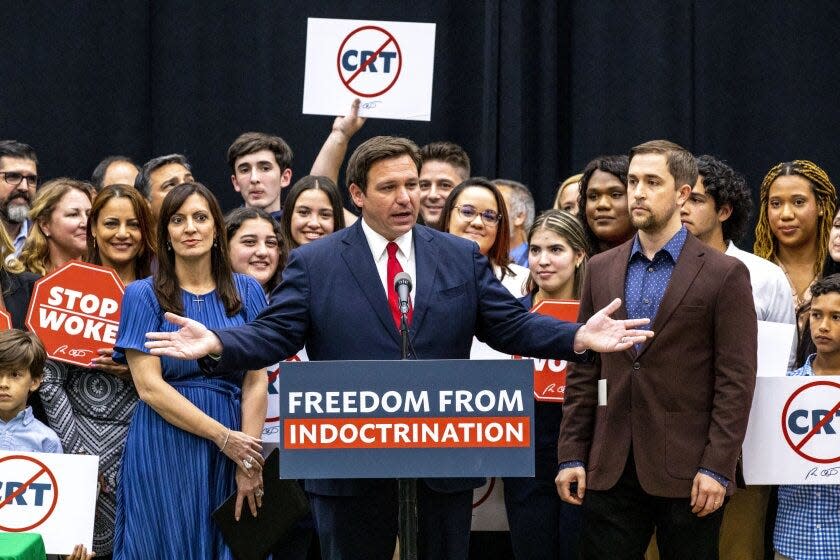State law in Florida still requires schools to teach about racism
As the new school year begins this month, many people have questions about whether and how schools can teach about racism and related topics in the classroom. The passage of the Individual Freedom bill last April, also known as HB 7 or the “Stop WOKE Act,” has created concern among educators that such topics cannot be discussed in K-12 public schools.
These concerns are understandable. Indeed, HB 7, like many laws targeting critical race theory passed nationwide over the past year, has added new legal context to how such topics are discussed in schools. With state and school district guidance still emerging and court cases challenging the law pending, many teachers may feel unsure of how to proceed and be tempted to avoid such topics.
That is why it is important then to push past the prevailing narrative about what is not allowed under the new law and remind ourselves of what state law does require. And here it is — state law in Florida requires schools to teach about racism.

State law explicitly requires instruction in the history of the African American experience including “prejudice, racism, and stereotyping.” In fact, this language is in the statute amended by HB 7 itself.
The law is clear that such instruction can include topics from slavery to racial oppression, segregation and discrimination. What is more, the law states that these topics can be discussed both as a function of bias on the part of individuals but also the ways in which “enactment and enforcement of laws” have contributed to such discrimination.
The teaching of racism is also included in state academic standards. Specifically, the state social studies standards include topics from slavery to the civil rights movement to the Black power movement. State standards include discussion of Reconstruction, Jim Crow laws’ impact on African Americans and the African-American experience throughout the nation’s history.
Several standards require the discussion of current events, of which issues of race are prominent. State recommended reading lists for civics include readings that center such topics as well.
Clearly, such state standards cannot be addressed without discussion of racism. Racism is a documented part of the nation’s history and is a continued experience for many.
More from Chris Curran:
Federal response to school shootings might frustrate, but bill was result of compromise
Several factors contributing to rising violence, misbehavior in schools
Standardized tests in schools aren’t going away, but innovation is welcome
The historical and scientific evidence for individual bias and systemic discrimination through government action are clear in the research literature. Equally evident are the lived experiences and stories of individuals who have experienced such racial discrimination. Educators then can rest assured that the teaching of these topics is grounded in evidence — just like other historical wrongs including the Holocaust.
To be fair, the new legal context does place restrictions on how topics related to race are taught. These limits, however, need not stand in the way of teaching about the historical reality of racism in America.
For example, schools cannot teach that students of a particular race are inherently racist. But they can teach that individuals are socialized into racist views and structures from an early age, a perspective which is consistent with many prevailing conceptualizations of racism.
The new law requires that schools not instruct students that they “must” feel guilt or anguish for actions committed in the past by members of their race. However, this does not mean that a lesson that accurately presents the historical and ongoing experiences of racism cannot evoke a range of emotions in students, including guilt or anguish. Even critical race theory itself can be included in instruction if done so in a way that presents it alongside other theoretical perspectives.
For some teachers, the new law may require some rethinking of how they approach these topics. For many though, current practices are likely already in line with the new law.
As this new school year starts, teachers should remember that teaching about racial discrimination and racism is a required part of public schooling in Florida. Doing so is mandated by state law, included in state standards and grounded in evidence.
While the new legal context may require some navigating, backing away from discussion of these topics in public schools is not an option.
F. Chris Curran is an associate professor and director of UF's Education Policy Research Center (www.ufedpolicy.org). This piece is part of regularly recurring op-eds from faculty of the center.
Join the conversation
Share your opinion by sending a letter to the editor (up to 200 words) to letters@gainesville.com. Letters must include the writer's full name and city of residence. Additional guidelines for submitting letters and longer guest columns can be found at bit.ly/sunopinionguidelines.
Journalism matters. Your support matters.
Get a digital subscription to the Gainesville Sun. Includes must-see content on Gainesville.com and Gatorsports.com, breaking news and updates on all your devices, and access to the eEdition. Visit www.gainesville.com/subscribenow to sign up.
This article originally appeared on The Gainesville Sun: F. Chris Curran: Why Florida schools have to teach about racism

